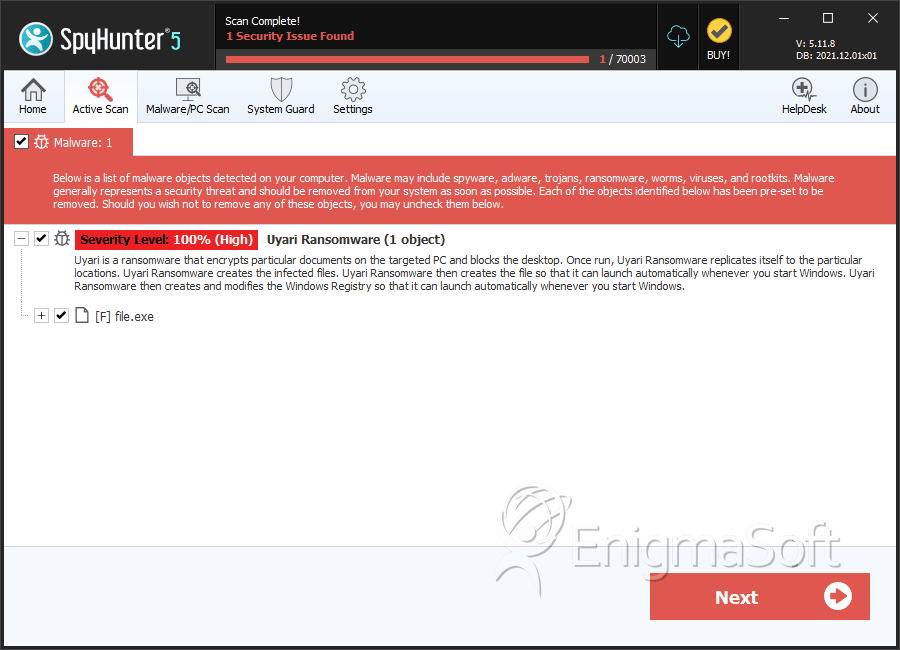Uyari Ransomware
The Uyari Ransomware is a ransomware Trojan that is used to force computer users to spend a large volume of money to recover their files, which are taken hostage via an encryption algorithm. PC security analysts discovered the Uyari Ransomware recently. The Uyari Ransomware uses a ransom note written in Turkish. The Uyari Ransomware demands a ransom of 2 Bitcoin. The files encrypted by the Uyari Ransomware can be identified easily because the Uyari Ransomware changes the encrypted file's extension to '.locked.' Whenever the Uyari Ransomware encrypts a file, it creates a ransom note named 'DOSYALARINIZA ULAŞMAK İÇİN AÇINIZ.html' on the affected computer's Desktop. Fortunately, it is possible to decrypt the files encrypted using the Uyari Ransomware's encryption algorithm. Malware analysts recommend that computer users check with their computer security provider for a decryption utility if their computers are infected with the Uyari Ransomware. Under no circumstances should the computer user pay the Uyari Ransomware's ransom.
Table of Contents
The Uyari Ransomware’s Demanded Ransom is Very High
The Uyari Ransomware attacks seem to be concentrated on Turkey currently. PC security analysts advise taking precautions when having contact with computers or online content from this part of the world. The Uyari Ransomware attack is typical of these ransomware Trojans. The Uyari Ransomware enters the victim's computer and encrypts the victim's data. The Uyari Ransomware drops a ransom note written in Turkish, which informs the victim of the attack and contains instructions for payment and removal.
If the ransom note is appearing on the victim's computer, this means that the victim's files have already been encrypted by the Uyari Ransomware. Like most ransomware attacks, the con artists responsible for the Uyari Ransomware demand that the victim pays a large ransom (averaging about $1200 USD) to obtain a decryption key that would allow them to recover the encrypted files. While it may not be possible to recover the encrypted files without restoring them from a backup, in the case of the Uyari Ransomware, PC security researchers have developed a decryption utility to help computer users affected by this threat. PC security analysts recommend that computer users use a reliable, fully updated anti-malware program to remove the Uyari Ransomware infection completely. Then, using a decryption utility made available by PC security analysts, computer users can decrypt the files encrypted (which can be identified through the '.LOCKED' extension) or recover their files from a backup location.
How the Uyari Ransomware may Spread and Enter a Computer
There are several ways in which threats like the Uyari Ransomware may spread. The most common way of distributing the Uyari Ransomware is through corrupted email messages, which will either contain the Uyari Ransomware in a file attachment or an embedded link leading the computer user to an attack website that installs the Uyari Ransomware on their computers. Computer users should always avoid opening unsolicited email attachments or clicking on links contained in unsolicited email messages. Having software that is out of date also may allow these threats to leverage weaknesses in a computer's security and carry out their attacks. Because of this, a combination of good security software that is always up-to-date and caution when dealing with suspicious online content can prevent most of the Uyari Ransomware attacks.
The best protection against attacks like the Uyari Ransomware, however, is to ensure that you have a backup of all of your files and update this backup regularly. Having your files backed up on an external drive (that is not directly connected to your computer – to prevent your backup from also coming under attack) can help you recover from ransomware like the Uyari Ransomware easily. If computer users can simply restore their files from a backup, then they have no need to pay the Uyari Ransomware's ransom or become victims to any of the countless similar tactics that are currently active in the wild. Fortunately, in the case of the Uyari Ransomware, it is possible to restore the files using a decryption utility.
SpyHunter Detects & Remove Uyari Ransomware

File System Details
| # | File Name | MD5 |
Detections
Detections: The number of confirmed and suspected cases of a particular threat detected on
infected computers as reported by SpyHunter.
|
|---|---|---|---|
| 1. | file.exe | be6ece0c36cd22e18cd00f1839f216a4 | 0 |


Submit Comment
Please DO NOT use this comment system for support or billing questions. For SpyHunter technical support requests, please contact our technical support team directly by opening a customer support ticket via your SpyHunter. For billing issues, please refer to our "Billing Questions or Problems?" page. For general inquiries (complaints, legal, press, marketing, copyright), visit our "Inquiries and Feedback" page.